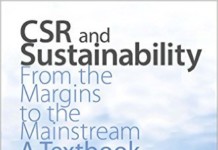In a complex economy on a crowded planet, there is a desperate need for rules and regulations that respond to the international stress and complexity that our global economy has created. We need rules to ensure that economic life does not destroy the planet that provides us with food, air, and water.
Sustainability Policy: Hastening the Transition to a Cleaner Economy is a strategic guide for envisioning, developing, and implementing effective sustainability public policies that will bring about the transition to a renewable resource-based economy. The private sector cannot make the transition from a waste-based economy to a renewable one by itself. This transition can only happen if we can create a public–private partnership. The authors and public policy experts, Steven Cohen, William Eimicke and Alison Miller, show what it takes for federal, state and local governments to create policies to support sustainability in the areas of water, energy, waste management, and more.
Sustainability Policy explores the government’s strategic role in critical areas such as funding basic science and infrastructure, to providing financial incentives, to building effective public–private partnerships. Cohen, Eimicke, and Miller outline the sustainability policy tools that are available at the federal, state, and local levels and explore the elements that constitute effective policy, and the factors that can help or hinder implementation and adoption. At the heart of the book, the authors detail programs that have proven effective in the United States as well as policies from other nations that can serve as standards that could be adopted by our government. With examples from around the world, the authors make the case that cities are at the cutting edge of sustainability initiatives as forward-thinking city policymakers experiment with innovative energy initiatives, air quality programs, community design, and climate resiliency projects.









